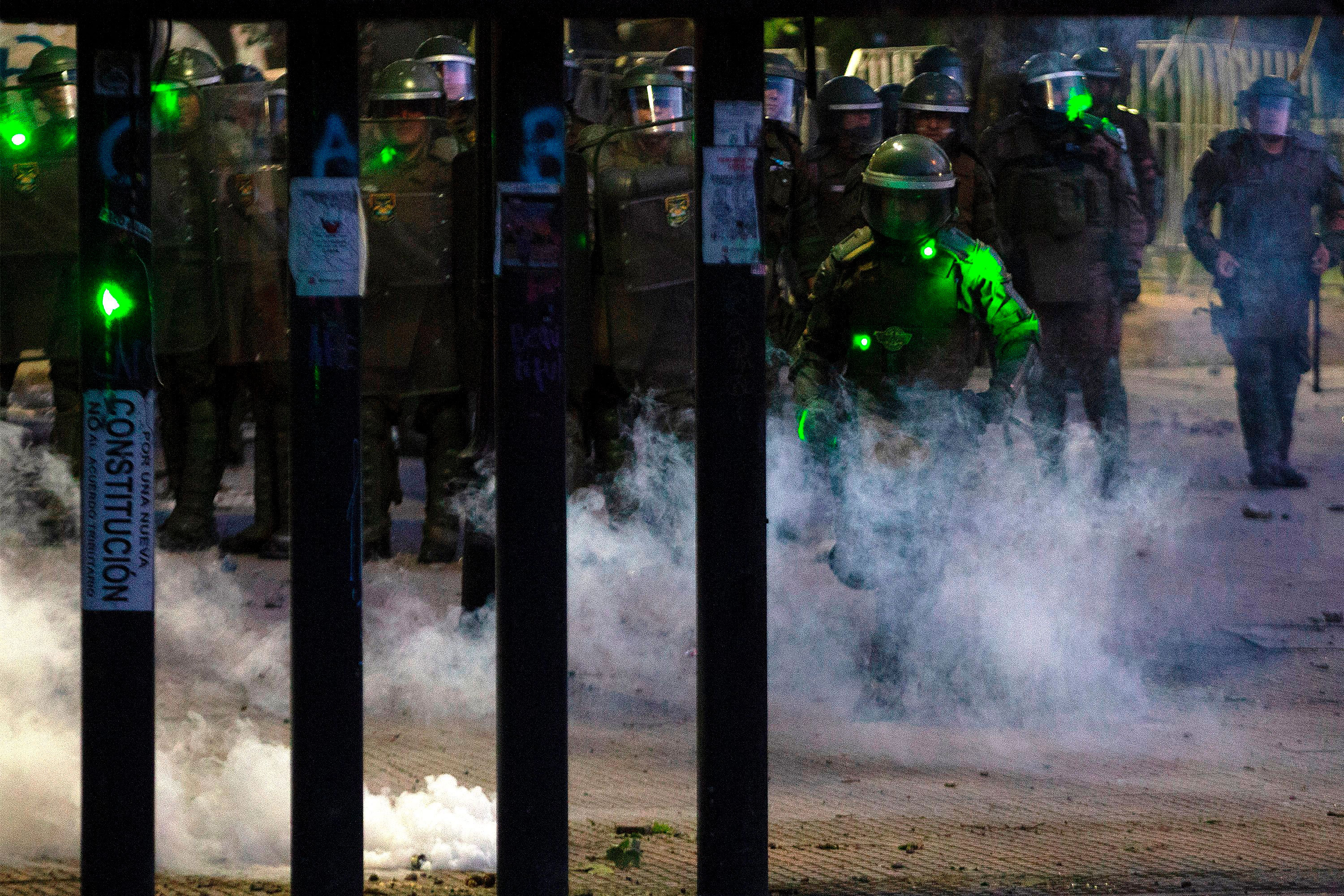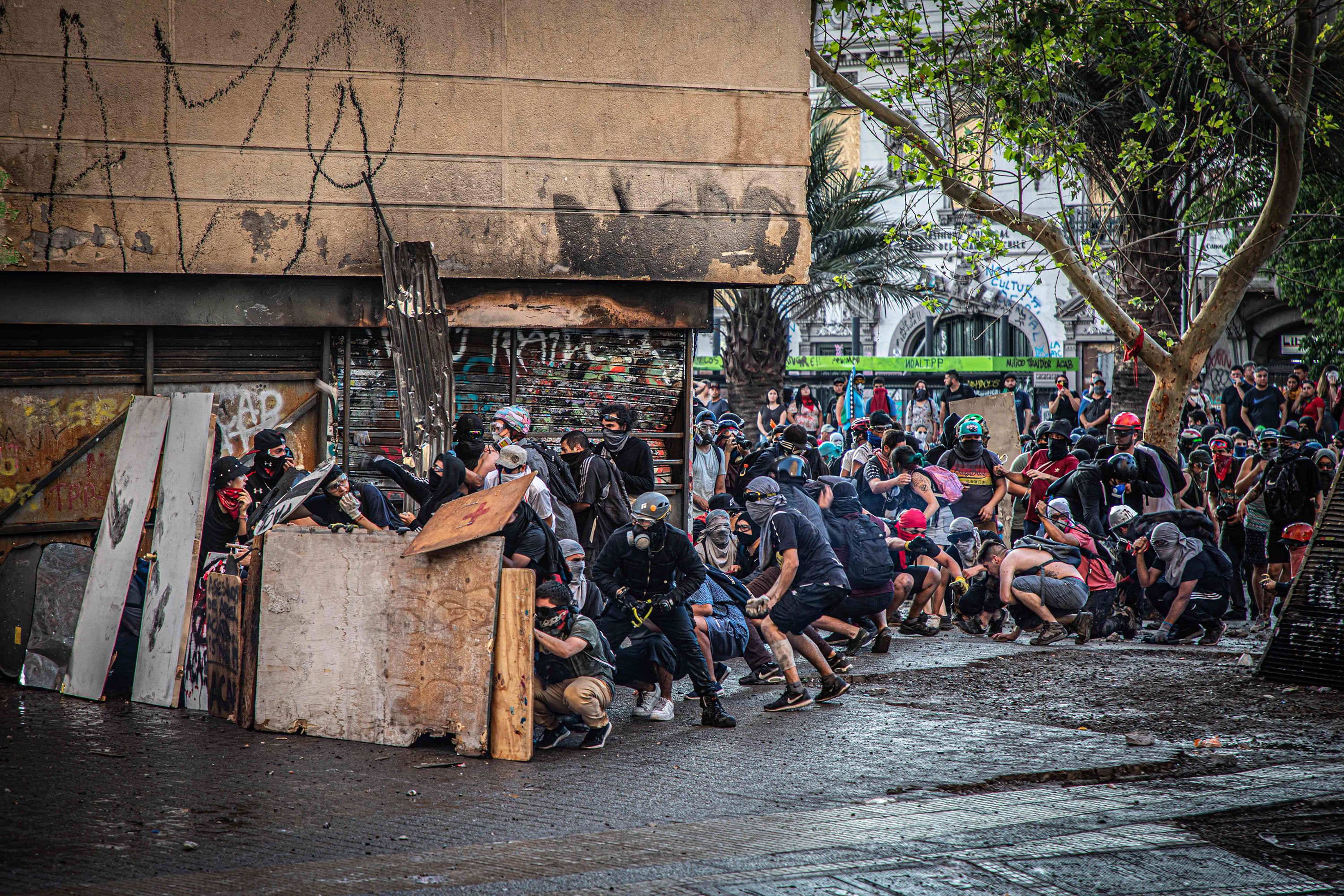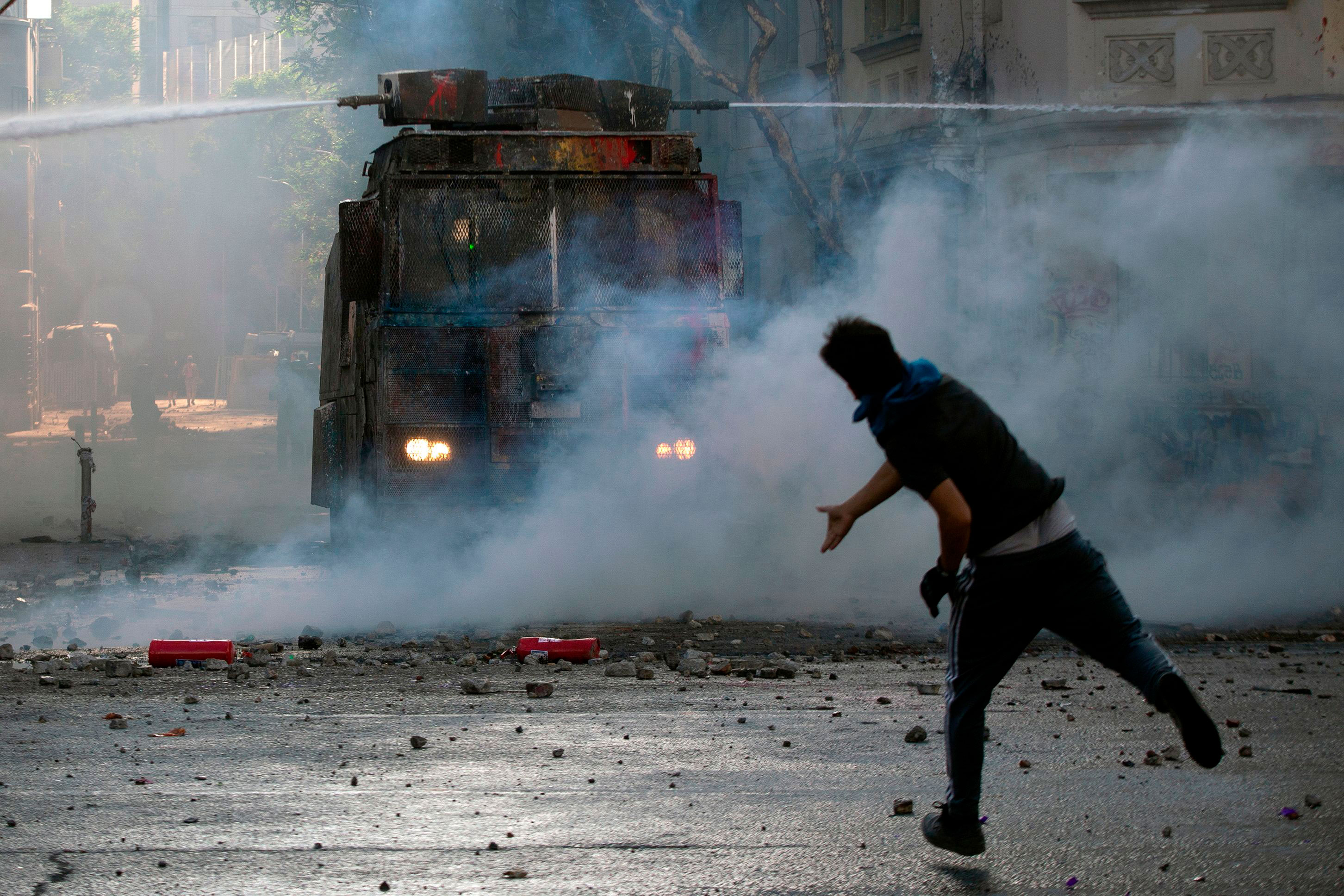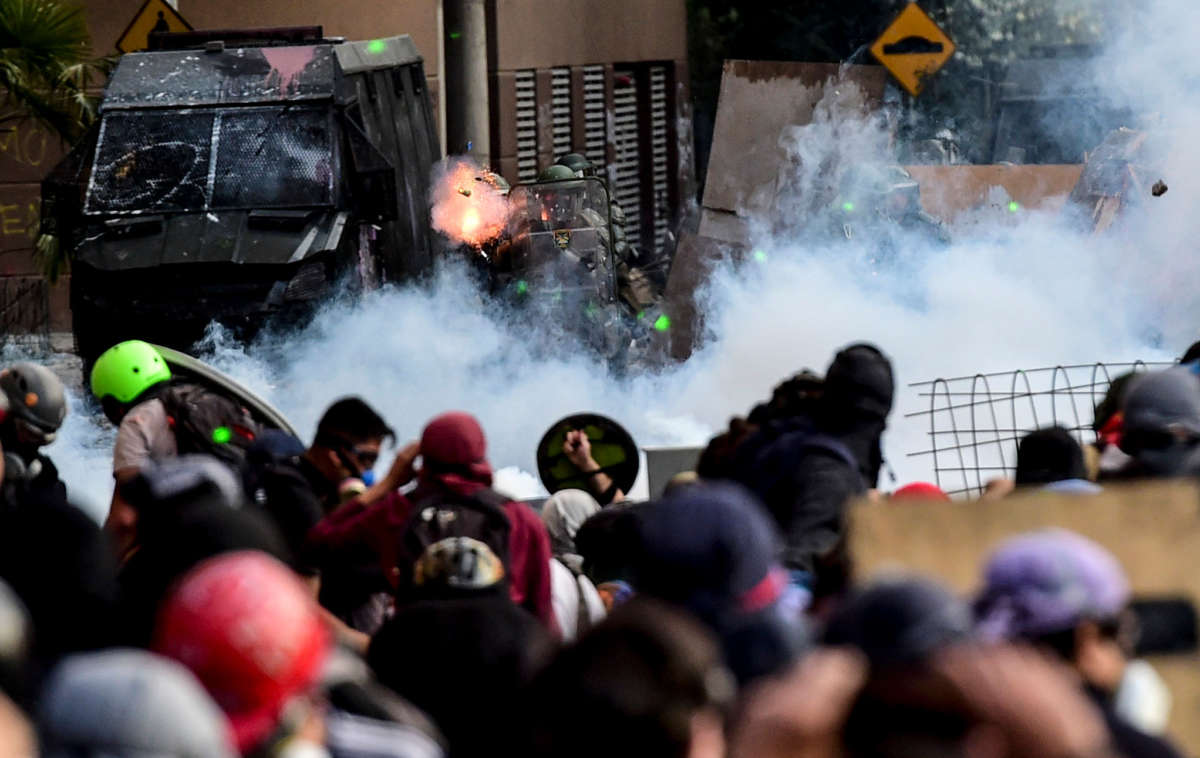Chilean Government Cracks Down as Protest Becomes Deep Movement for Change
Moving into the sixth week of massive protests, Chilean authorities have shown few signs of resolving the crises that began over a public transportation fare hike and quickly evolved into widespread criticism of the country’s profound inequality and neoliberal policies. Instead of seeking democratic solutions that engage relevant social and political sectors, President Sebastián Piñera’s government has responded with brutal force to subdue popular dissent.
So far, the crisis has claimed the lives of 26 people, five of whom were killed by the military or police and two who died in police custody, according to the local Prosecutor’s Office (Fiscalía).
Between October 17 and November 25, the National Institute of Human Rights (INDH) documented 7,259 arrests, 2,808 hospitalizations, and filed 499 lawsuits against the Chilean State, of which 369 are for torture and 79 for sexual violence, including four cases of rape. However, Human Rights Watch reported that over 15,000 people have been arrested between October 18 and November 19 and another 2,000 were “retained” during the state of emergency from October 19-17. Nearly 270 people have suffered severe eye trauma from riot gun ammunition, many losing permanent vision in at least one eye. In late October, the Chilean Medical Association (Colegio Médico) described this situation as a sanitary emergency and called for police to cease their use of rubber and metal buckshot, which was suspended temporarily on November 19.
Police and military action have come under harsh scrutiny from international NGOs and human rights organizations. On November 21, Amnesty International published a scathing report alleging that Chilean armed forces and police have deliberately sought to harm protesters, directing political responsibility at authorities. The government denied the allegations, calling them biased, and the armed forces released its own defense, which some see as a lack of political control over the military. Human Rights Watch, the UN Human Rights Council and the Inter-American Court of Human Rights are expected to publish their findings within the coming weeks.
While authorities continue giving speeches about the need to restore public order and prevent crime and vandalism, a growing number of Chileans are viewing the police with suspicion, disbelief and rage. Recently, leaked police documents revealed that officers have been spying on social and environmental activists, university and high school student leaders, and several academics. On November 13, a leaked audio of the director general of Carabineros, Mario Rozas, exposed his intention of providing total impunity to officers, regardless of the consequences. In a recent press briefing, General Enrique Bassaletti compared the social unrest to cancer and that both good and bad cells must be killed in order to treat the illness, a metaphor reminiscent of the language used by state intelligence agencies during Pinochet’s 17-year dictatorship. In 2018, the Carabinero police force was already involved in a multimillion-dollar corruption scandal that funneled more money than the estimated costs of repairing public property damaged in Santiago during the current protests.

Piñera’s recent measures to double down on repression have added to public skepticism toward the police force. He recently proposed a series of security measures that include harshening sentences against hooded protesters, reintegrating retired officers into the police force and fast-tracking academy training in order to add several thousand new officers by December. On November 24, he announced a proposal to deploy the military without having to declare a state of emergency in order to secure “critical infrastructure” like water-processing and power plants, neither of which have been threatened by protests. This measure requires congressional approval.
Since the outburst, local mainstream media outlets have focused primarily on looting and arson, setting in motion an informational blockade that has contributed to official efforts to criminalize the social movement. After Piñera met with television executives in late October, an influential news editor at Canal 13 resigned and several progressive TV personalities have been fired from other networks. As a result, Chileans have grown ever more skeptical of the television and traditional newspapers, relying on social media to build a counteroffensive of video footage and independent reporting that helps grasp a clearer picture of what is going on throughout the country.
On November 18, Piñera’s approval rating plummeted to 9.6 percent with disapproval reaching 85 percent, according to Activa Research, a market and public opinion research firm. Even the more conservative Cadem poll reported on November 25 that the president’s approval dropped from 17 percent to 12 percent, a record low for the firm. Polls can be misleading but the social climate is not. “Piñera, resign” is tagged all over the streets of Santiago and has turned into a popular chant at rallies and marches, as have slogans like “Chile woke up,” “Dignity,” “Until life is worth living,” and “New Constitution.” On November 17, members of Congress submitted a Constitutional Accusation against Piñera for his responsibility in human rights violations, initiating a process similar to an impeachment inquiry, though it is not expected to garner much congressional support.

Despite minor concessions to alleviate the high costs of living for the country’s poorest, the government has not proposed any structural change to reduce inequality. According to Chilean NGO Fundación Sol, 70 percent of Chilean workers earn less than 550,000 Chilean pesos (CLP)per month ($663 in U.S. dollars) and 1 percent concentrates 33 percent of the country’s income, while 0.01 percent concentrates 11.5 percent with monthly salaries of over 576 million CLP (approximately $695,000 in U.S. dollars). The so-called social agenda, which was nonexistent before the outburst, includes freezing electricity price hikes until the end of 2020, regulating highway toll increases only by the consumer price index, raising minimum wage by CLP 49,000 (U.S. $59) to 350,000 per month (U.S. $422), and adding a 50 percent bonus to the lowest pensions, which, at such miserable returns, translates into a total of CLP 165,301 per month (U.S. $200).
One of the major social demands consists of abolishing Chile’s privatized pension system, designed by José Piñera, the president’s brother, and based on a scheme of individual capitalization. Heavily influenced by Milton Friedman’s school of economics, José Piñera served as Pinochet’s minister of labor and social security from 1978 to 1980, overseeing the compulsory transfer to privatized pensions. Whereas the general population is bound by this system, the police and military benefit from generous, state-administered pensions, widening an antagonistic divide between the armed forces and civilians.
The government has, however, adamantly resisted touching the neoliberal system, shielded by a Pinochet-era constitution, which has created a subsidiary state to finance private-sector initiatives through concessions of highways, utilities, hospitals and schools. Attributed to the intellect of Jaime Guzmán, the Constitution of 1980 is a textbook example of shock doctrine politics, as the legal basis for free-market policies forced upon the population during a time of extreme state-administered terror. Though Congress members signed an agreement on November 15 to hold an April 2020 plebiscite for a new constitution, thus marking a step forward in possibly abolishing one of the dictatorship’s major legacies, technical details regarding the process remain ambiguous and critics point out that key social actors and several left-leaning political parties were excluded from negotiations.
One aspect international media has overlooked in covering the Chilean protests is that the violence unleashed against citizens since October 18 has mirrored the last 30 years for the Indigenous Mapuche people in southern Chile. As the country’s largest Indigenous population, the Mapuche have resisted century-old attempts at colonization, from the Spanish conquistadors to Chilean military campaigns in the late 19th century. Present-day lumber companies, like Arauco and Forestal del Sur, control much of their ancestral lands, leaving the population reduced to reservation-like communities wrought with poverty. Since the end of the dictatorship in 1990, demands for autonomous political status have been met with the militarization of their territories, even under the more progressive administrations of Michelle Bachelet (2006-2010, 2014-2018). Mapuche farmer Camilo Catrillanca was the last fatal victim in this ongoing struggle, shot in the back by police on November 14, 2018, near Temucuicui.
Widespread support within the broader Chilean population for the Mapuche struggle has resurged during the protests of October and November. As Mapuche historian Claudio Alvarado Lincopi has suggested, this may be a sign that Chilean society is beginning to acknowledge its Indigenous identity, denied through centuries of institutionalized racism. Resisting efforts to exploit natural resources such as timber or invasive dam projects, the Mapuche, as many Indigenous groups throughout the Americas, have provided an important model for environmental activism. Mapuche leaders have now adhered to the larger social demands with a notable presence in Temuco and Santiago. They insist on the need to push for a plurinational constitution, similar to Bolivia and Ecuador, which would seek to recognize Mapuche, Aymara and Quechua Indigenous peoples as autonomous nations within the State of Chile.

As Chile sees continued massive protest, much of the population remains on edge, unsure of what will happen next, exhausted from the mixed emotions of hope and horror. Every day, new videos emerge of Carabinero police indiscriminately beating, shooting, arresting, tear gassing, stripping, and running over unarmed civilians. Every day people are taking to the streets of Santiago, Valparaíso, Concepción and other major cities to bang pots and pans, blow whistles and shout from their balconies or patios that Piñera is a murderer and dictator, and that the police are torturers and rapists. Every day, people are organizing local assemblies to discuss solutions for their neighborhoods, schools and work environments.
What began as a social outburst over widespread discontent has unfolded into deep grassroots organization to urge political change. While many politicians insist that bipartisan cooperation has led to progress, it is the Chilean people who have taken matters into their own hands by way of local assemblies, many of which are channeling concrete proposals through a coalition of social organizations known as the Mesa de Unidad Social. If a constitutional convention is organized, these proposals will need representation to validate the process.
Just earlier this year, Piñera had offered fervent criticisms of Nicolás Maduro over human rights violations and media censorship in Venezuela. Now his cynicism is on full display as he turns around and gives the order to repress, persecute, misinform and intimidate anyone who challenges his government’s agenda. Instead of sacrificing personal gain and seeking resolutions to Chile’s profound inequalities, Piñera has waged a war against his people, triggering a spiral of violence that will scar the country for years to come.





Geen opmerkingen:
Een reactie posten